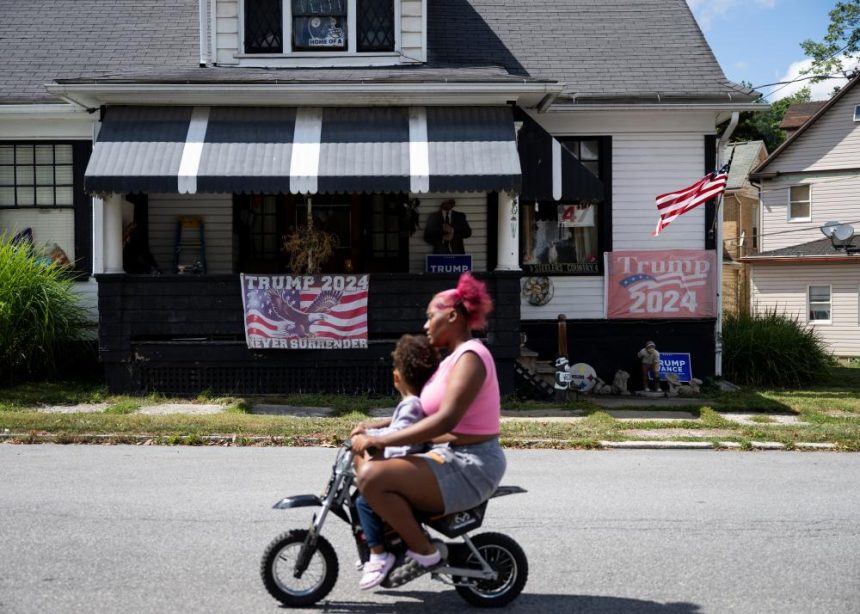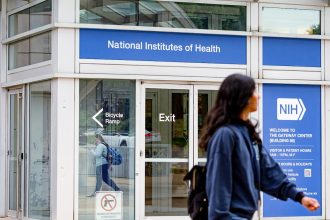Ernest Hairston has a plan. He’s going to buy a car and find a job, then he’ll be able to start saving for a down payment on a house.
A car this year, house next. That’s his plan. But first, he has to fix his health.
The downtown Rite Aid where he used to get his diabetes meds closed, and the new pharmacy is out of supplies. He’s gone without medicines now for seven weeks, and it’s making him sick.
When the Guardian arrived at his rental apartment in Johnstown, western Pennsylvania, it took him several minutes to struggle out of bed and to the door.
“The drugs are all out my system now, so I’m shaky,” he said, looking pale as we sat talking in his spartan kitchen. “Once I get them, it’ll take three weeks to get back regulated, then everything will be fine.”
Until then, Hairston is living on borrowed time. He has a couple of dollars in the bank, and is drawing down his last paycheck: $227 that he cashed a week ago.
Until he found a place to live last year, he was homeless for more than a decade. He slept in his Sonata and on friends’ couches. Having a home has helped him stabilise, but the community group that subsidises his $800 a month rent just lost its government grant and won’t be able to do so past September.
That leaves him with Snap, the federal government program that pays him $6 a day for food.
For a Black man in largely white Johnstown who has no money, no car, no job, no drugs for his chronic health condition, and a rental apartment that he soon won’t be able to afford, Hairston, 61, is remarkably cheerful. He has confidence in himself: “Even though I’ve hit a speed bump, I won’t let it stop me. It’s my value system, I have to work.”
And he has confidence in Donald Trump. A lifelong Democrat, Hairston switched allegiance to the Republicans last year and would have cast a ballot for Trump in November had his voter registration been in order.
Hairston has liked Trump since the 1980s when he read The Art of the Deal. “That was a very motivational book. How you don’t ever give up. You just keep going.”
He has some qualms about what Trump is doing now, cutting so many federal programs indiscriminately, including Medicaid, the government health insurance scheme for low-income people that he receives, and the Snap food assistance that is his final resort. But Hairston agrees with the president that welfare – the welfare on which he, too, depends – needs a radical overhaul.
“Too many people are on it who don’t need it. Y’all just riding the system for no reason. Y’all are healthy, you’re smart, go out and get a job. If you don’t, Trump needs to cut you off.”
Hairston’s best friend is Will Dill. They hang out together in a downtown drop-in center where Dill helps to run the Dungeons and Dragons club.
The center’s mission is to maintain the mental health and sobriety of its members. There’s a memorial board in the hallway festooned with photos of friends they’ve lost, some to opioid addiction, some to ill-health or other afflictions of the poor.
Dill, 27, regards Hairston and his peers at the drop-in center as family. Over the years, he’s wrestled with severe anxiety and agoraphobia, and has been diagnosed with PTSD and autism – a cocktail that in the past has kept him locked up indoors for months on end, too scared to leave the house and racked by suicidal thoughts.
Like Hairston, Dill counts on his $6-a-day Snap food allowance, as well as support programs that he can access through Medicaid. Unlike Hairston, he opposes Trump’s cuts to federal programs, and has a startling explanation why.
“Without federal government help, I would definitely be dead,” he said.
Throughout his teenage years, he reckons he made on average two serious suicide attempts each year. Since then he has made great progress – his last suicidal episode was eight years ago – but those dark days are preying on his mind.
“I’ve come very close over the years. If it wasn’t for the very talented and compassionate therapist I have seen through Medicaid, I wouldn’t be here.”
Now Dill fears for himself, and for the many friends who stand to lose Medicaid and other forms of federal assistance. Trump’s recent mega-bill requires “able-bodied” adults to prove they are working at least 80 hours a month to keep their health insurance.
That will be tough for Dill. He finds job interviews so anxiety-inducing they can bring on panic attacks, and although the new restriction won’t start until January 2027 – strategically timed by the Republicans to fall after next year’s midterm elections – he is already terrified.
“I’m very afraid that a lot of people are going to be hurt,” Dill said. “If we lose Medicaid it will be a vicious cycle of just down, down, down. I’m fearful people will die.”
***
The scars of Johnstown’s industrial decline are exposed for all to see. Almost half of the city’s downtown is occupied by the hulking mass of the Bethlehem Steel plant, its giant sheds distressed and largely disused.
The plant stands as a monument to America’s former industrial might. In the late 19th- and much of the 20th century it was at the epicenter of world manufacturing, employing in 1970 almost 12,000 well-paid members of the United Steelworkers union and supporting a host of local coal mines that fed its furnaces.
After the second world war, cheaper steel from overseas began to eat into the good times. Major cuts to the workforce started in 1973, and Bethlehem Steel was shuttered in 1992.
There’s nothing like kicking a horse when it’s down. Johnstown’s topography in the Conemaugh River Valley makes it vulnerable to flooding, and it has suffered three floods of biblical scale, most recently in 1977.
Which leaves Johnstown, and the surrounding rural areas that complete Cambria county in which the city sits, depleted. The area looks magnificent, wrapped in the emerald green of the Appalachian hills.
But beneath the gem-like surface, life is tough. More than 13% of the county’s 131,000 residents, including more than one in five children, live under the official poverty line, according to the US census.
That in itself is a gross underestimate of local need, says the anti-poverty community network United Way, which has developed its own measure known as Alice: asset-limited, income-constrained, employed. By this calculation, some 44% of households in Cambria county are surviving on less than the basic cost of living, rising to an astonishing 70% in Johnstown itself.
That’s more than two-thirds of the city’s residents who can’t afford necessities such as rent, child care, medical treatment, food. United Way of the Southern Alleghenies, the branch covering Johnstown, estimates that one in five children in the county experience hunger.
It’s an indication of Johnstown’s challenges that it even markets itself by its disasters. If you want a cup of coffee in downtown, go to Flood City Cafe; for home decorating, try Flood City Painting Company.
Now Cambria county has a new self-identification: Trump county.
Trump owes a huge debt to Cambria county and places like it across the US. Struggling post-industrial towns and their rural hinterlands in no small part put him in the White House, handing him Pennsylvania’s critical electoral college votes as well as a majority of the ballots of low-income Americans nationwide, according to exit polls.
Despite Johnstown’s proud Democratic and labour union history, Trump won Cambria county in each of his three presidential races, his margin rising each time. Last November he took 69%, to Kamala Harris’s 30%.
With such a large proportion of the population being financially hard-up, the county’s sharp turn to Trump raises the question that has troubled analysts since he burst onto the national political stage a decade ago. How did a billionaire businessman living a gilded life in a mock Louis XIV Fifth Avenue penthouse, whose politics are relentlessly pro-wealth, anti-union, and hostile to government assistance, appeal so potently to people like Hairston who has literally two dollars in the bank?
And how is Trump faring today with those low-income voters, now that he has been back in power for nine months, his global tariffs are taking effect, and most pertinently, his devastating cuts to federal programs on which so many poor Americans rely are starting to bite?
“My friends say to me, ‘You voted for Donald Trump’, and I say to them: ‘So did you!,’” said Brenda Ickes, 64, a retired nurse taking a stroll in the main square in downtown Johnstown, known as Central Park.
“They say, ‘He said he would make things better, and nothing’s better.’ I say, ‘He’s a politician, he’s going to need time to make things better.’”
Trump has bombarded Johnstown with promises over the past 10 years, piling the pledges up high like so many heaps of coal slag.
In his first election campaign he promised that “steel will come back” and “miners will be put back to work”. In 2020, he returned to Johnstown and promised voters they would have “safe communities, great jobs, and a limitless future for all Americans”. And last year, he came to the city once again and promised he would “cut your energy bills in half” and “defeat inflation”.
So many promises, not so much to show for it. Steel and coal have not returned, energy bills are rising, and inflation is ticking up again as the tariffs filter through to prices.
Official government labour statistics are so out of line with Trump’s promise to create good new jobs that the president felt driven to fire the official in charge of collating them.
If Trump’s new golden era of revived American middle-class greatness has yet to reach Johnstown, then what is starting to be felt locally are the federal cuts. They include:
-
Cuts to Snap food assistance. Trump’s mega-bill slashed almost $200bn from Snap funding over a decade. One in five people in Cambria county, some 26,000, receive the benefit. About 2,000 are likely to be thrown off, leaving them to fend for themselves.
-
Food banks, the last resort for hungry people, are also being hammered. Trump’s US Department of Agriculture (USDA) has eliminated two critical programs that supplied food banks with produce from farmers. The Greater Pittsburgh Community Food Bank, which serves Cambria county, estimates that this year alone it will lose more than 6m pounds of food that would have gone to hungry families.
-
Johnstown’s emergency shelters for homeless people are reporting that Fema, the federal emergency management agency, has not released the money they had been expecting. There are similar worries about $3.6bn in federal grants from the Department of Housing and Urban Development, HUD.
-
The federal program that provided low-income families with winter fuel to heat their homes has been slashed under cuts to the US Department of Health and Human Services. More than 10,000 cash grants of up to $1,000 were made last year to the poorest in Cambria county, aid that is now in jeopardy.
“Trump is breaking the backs of poor people,” said Rosalie Danchanko. For the past 13 years she has run the Highlands Health medical center that treats low-income people in Johnstown who lack adequate health insurance.
Now she sees cuts to Medicaid and other federal programs descending, and she is scared. “I think Trump’s plan is to make those with wealth become wealthier on the backs of poor people. Unfortunately my patients don’t get it, they just don’t see it coming.”
***
Some of the disconnect between Trump’s pledges and the harsh reality unfolding in Johnstown is starting to be seen. Charles Kelley, 45, a former welder now on disability after his ankle was crushed in a factory accident, said Trump “made us promises, and I ain’t seeing nothing yet”.
Food and other essentials are getting more expensive again, he said. Every other day he skips a meal himself, so that his four kids can eat.
“The way things are going, Trump’s got families being torn apart with these tariffs. Food’s rising, and he’s saying it’s getting better. Nothing’s getting better.”
Kelley didn’t vote last November. But even some Trump voters are starting to grumble, just a little.
“Disappointed? Sure I’m disappointed,” said Bill Thompson, 72, heading to the weekly shop at Walmart. “If Trump brought down prices, then tell me where to shop, ‘cos I haven’t seen them.”
Thompson worked down the coal mines for 18 years, living through the boom and bust. At the best of times, he was getting $27 an hour, a rate that later plummeted to $10.
Thompson doesn’t like any politician much, no matter what party. “None of them ever done nothing for me. They should all of them be thrown out.”
But the disgruntlement only goes so far when it comes to Trump. If the president were to be allowed to run for an unconstitutional third term in 2028, he’d be right back voting for him.
“He’s a liar like all of them,” was how Thompson articulated it. “But at least he’s got balls.”
For all the talk of disappointment, most Trump voters in Cambria county appear happy to give the president more time to deliver on those piles of promises. John DeBartola, 48, the Maga Republican nominee for mayor of Johnstown, says that when he’s out canvassing, he never hears complaints on the doorstep about prices or federal cuts.
What he hears, he says, is a desire for change. “Trump is the change candidate. Love him or hate him, he’s a change-maker. People want that.”
DeBartola, by his own admission, is “not the typical Trump supporter”. He is the openly gay organiser of Johnstown’s Gay Pride festival, the main draw of which this year was the lesbian folk-rock duo the Indigo Girls.
“There’s a lot more people like me in the Maga movement than people want to admit,” he said.
The Republican, who until Trump’s first run in 2016 was a committed Democrat, is running for mayor under a mantra of “Make Johnstown Great Again”. If that sounds derivative, that’s because DeBartola wants to do to Johnstown what Trump is doing to America.
He aspires to create the city’s very own Doge, the government-destroying bulldozer pioneered by Elon Musk. He sees that as a first step to eradicating the dependency culture that in his view attracts poor people to Johnstown, making the city’s population disproportionately reliant on government handouts such as section 8 federal housing subsidies.
There’s another reason DeBartola is not typical. For seven years as a teenager he was mute – unable to speak as a result of cancer of his vocal cords.
The “horrible ordeal”, as he describes it, meant he was himself dependent on government assistance for years. “Oh, yeah, I was,” he said. “And I support the programs, because there’s a need for it. This population could absolutely not survive without safety nets.”
DeBartola sees no contradiction between his support for safety nets and his equally firm approval of Trump’s welfare cuts. “There’s too much of a concentration of poverty here,” he said. “It becomes a way of life, and it sets people up for failure. When I was sick, I was on assistance, but when I got better I got off the programs. We have to get people back to work.”
You hear that argument – that people should stand on their own two feet – a lot from Trump voters in Johnstown. It’s an idea that is imbued with the age-old distinction between deserving and undeserving poor that Charles Dickens so searingly depicted in Victorian England.
The concept is thriving in today’s Johnstown. It has been enthusiastically embraced by large swathes of a vulnerable community that is turning in on itself.
“What happens in this town is that people look for something to blame, rather than questioning our own contributions to the problem and how we can lend a hand,” said Karen Struble Myers, president of United Way of the Southern Alleghenies. “There’s this notion that you can pull yourself up by your bootstraps, but the fact is, we need other people, we need community.”
Trump has monetised that blame game, using it to justify almost $1tn federal cuts to Medicaid that he needed to fund tax breaks for the rich. His imposition of work requirements on Medicaid recipients – the first such restrictions in the scheme’s 60-year history – plays to the stigmatization of poor people as work-shy, even though almost six in 10 working-age adults on Medicaid are employed.
I find Dave, 73, enjoying the sun in Central Park. Having worked for years in a foundry and lumber yard, he is now living on social security.
He described to me his childhood outside Johnstown. His father, a welder with Bethlehem Steel, instilled in him from the age of 14 that he should “get your butt out of bed and go get a job”.
If he resisted, “we got our ass beat.”
Dave recalls his dad beating him with whatever lay at hand at least a couple of times a week. When he was caught smoking, his father cut the cigarette in half and made him eat it. When found drunk, he was made to finish the whole bottle until he vomited.
Did it change his worldview?
“Oh year, real quick. My dad didn’t mess around. He was old, old-fashioned.”
The only thing that Dave, who didn’t want to share his last name, doesn’t like about Trump is that he’s not acting fast enough. “I want to see him move quicker. Quicker. Open up the coal, get all these bums to work.”
He pointed to the street that runs around the park. “Trump should look at the people on disability, welfare, food stamps, medical cards, and tell them: ‘Tomorrow morning there’ll be a bus that’ll pull in here. Make sure you’re on it, and go to work. If you don’t, if you sit in your lazy chair, I’ll shut you off for everything.’”
***
Trump’s assault on the poor stands out from previous presidents of both main parties because of the depth and breadth of his federal cuts. Medicaid being exhibit No 1.
Almost a third of Cambria county residents rely on Medicaid as their primary healthcare insurance. An analysis by Pennsylvania Health Access Network, Phan, estimates that 34,000 people in the state’s 13th congressional district, which covers Cambria county, are at risk of being kicked off the program as a result of Trump’s mega-bill.
Cain Varmecky knows what losing Medicaid means. A year ago, when she turned 26, she was taken off her parents’ health insurance in Johnstown and was too cash-strapped to replace it herself.
As an uninsured person, she had to come off her medication for severe epilepsy, which until that point had been under control. Within weeks her condition deteriorated, and she suffered grand mal seizures of increasing frequency and intensity.
She remembers the day when she had to decide between saving her own life and going into medical debt.
She had what she describes as a “premonition” that something bad was about to happen, so she lay on the floor to protect herself. As she went into the seizure she checked the clock on the wall, and that way knows that it lasted six minutes.
An episode that long can kill. It can lead to permanent brain damage, physical injury, and cardiac arrest. Patients are advised immediately to call 911.
Varmecky did not make the call.
“I made the executive choice not to call. I would be thousands, maybe tens of thousands, in debt.”
She spent the next several days in a daze, unable to speak, falling over, barely functioning. She knew that if she went into another seizure, it would be her last.
“I made a choice to bargain with my life.”
The bargain paid off. In February, Varmecky finally got accepted onto Medicaid. Her epilepsy is back under control.
“I’m healthy again, not living in constant fear.”
Recently, though, doubts have started to creep back. “What if, in six months, I’m knocked off my Medicaid? What’s going to happen then?”
These are not idle questions. A study by the University of Pennsylvania and Yale looked at the impact of Trump’s Medicaid cuts and estimated that under them more than 50,000 low-income and vulnerable people across the US would die each year from preventable causes.
Phan applied those calculations to Pennsylvania’s 13th district and concluded that 150 people in the region around Johnstown would die each year needlessly. “This is a matter of life and death for thousands of people who now face real-life consequences from the largest healthcare cut in American history,” said Phan’s policy director Patrick Keenan.
Robbin Ford, 58, is already facing such consequences. She is one of the uninsured patients treated at the Highlands Health clinic, having just been taken off Medicaid. She has been told she is “out of compliance” and must reapply for coverage, a prospect that fills her with dread.
Last week she had cardiac surgery for an irregular heartbeat.
Her husband, Francis, recently lost his job with a company importing electrical products from China. When the first round of Trump’s tariffs beckoned, management laid off seven workers from a workforce of 100 – he was one of them.
With income running low, the couple are faced with hard choices. “Do we pay the electric this month, or do we eat?”
When all else is lost, they go to the food bank. Ford tries not to think of using this resource as demeaning, but she still finds it difficult.
“It’s hard to go to a food bank, when we used to be the ones who donated to the food bank.”
She feels a wave of disapproval building towards her locally. She hears the mantra from Trump officials on TV telling her she should be looking for work.
But she is looking for work! She must have filled out 200 job applications in the last six months. Only a handful replied, most of them scammers.
“It makes me feel that in Trump’s eyes I’m not worthy of government handouts. I thank God that the president and his officials have everything they need. If they ever lost that, maybe they might understand.”
***
Nijmie Dzurinko, co-founder of the grassroots healthcare campaign Put People First PA which is active in Cambria county, sees the current moment through the long lens of post-war American history. Viewed this way, both main parties, Republicans and Democrats alike, have presided over the region’s demise.
She points out that under Joe Biden’s presidency, Medicaid protections that had been in place during the pandemic were withdrawn, stripping 633,000 Pennsylvanians of their health insurance. Look further back, and Bill Clinton was the first to inject work requirements and time limits into welfare benefits, in his pointedly named 1996 legislation, the Personal Responsibility and Work Opportunity Reconciliation Act.
Clinton’s move was “part of the false narrative of the American dream, that if you work hard, you advance”, Dzurinko said. “It’s one of America’s mental fortresses, these deeply ingrained ideas in US culture: that poverty is the fault of the people in poverty themselves.”
A look through this longer lens helps explain the widespread skepticism among low-income people in Johnstown towards those in power – whatever the political party. Other than when Trump is on the ballot (81% voted in November’s presidential election), turnout in Johnstown is witheringly low. Just 22% of registered voters participated in the recent mayoral primary elections.
Ernest Hairston is a case in point. During the prolonged period ending last year in which he lived unhoused, there was a Democrat in the White House for eight of the 11 years.
Hairston doesn’t hold presidents personally responsible for his plight. But, in a way, that’s the issue – he’s come to expect so little from any incumbent of the Oval Office.
“Remember, it’s all a magic show,” he said. “Whenever there’s a new president they say, ‘Look at my hand here! Watch it slide there! Listen to my promises!’ Then boom, it’s all gone!”









